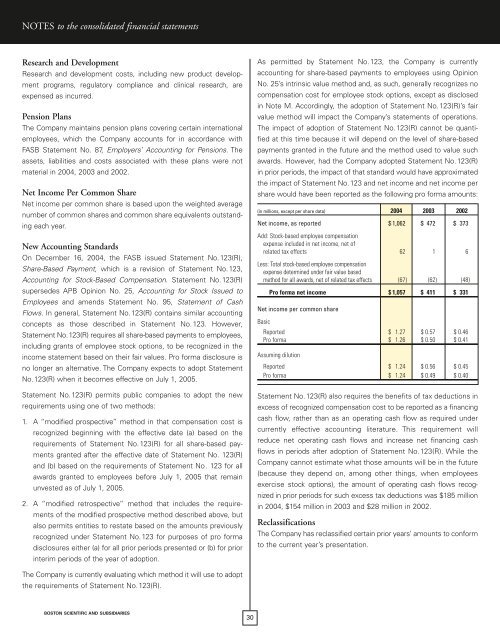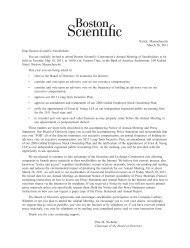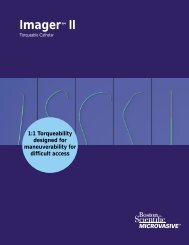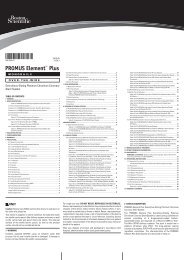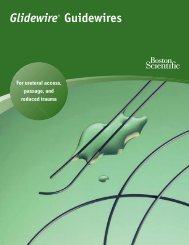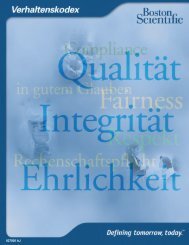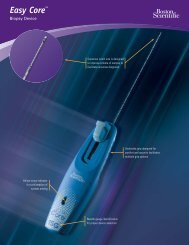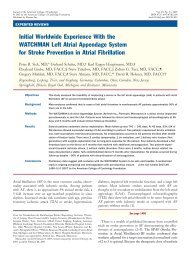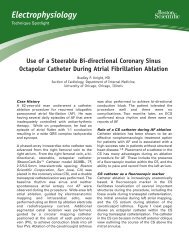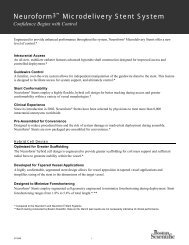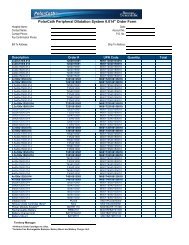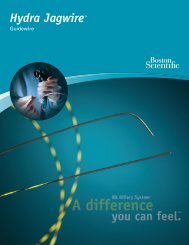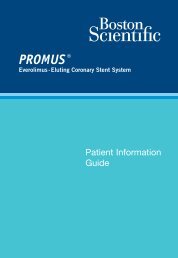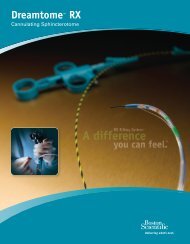CONSOLIDATED FINANCIAL STATEMENTS - Boston Scientific
CONSOLIDATED FINANCIAL STATEMENTS - Boston Scientific
CONSOLIDATED FINANCIAL STATEMENTS - Boston Scientific
Create successful ePaper yourself
Turn your PDF publications into a flip-book with our unique Google optimized e-Paper software.
NOTES to the consolidated financial statements<br />
Research and Development<br />
Research and development costs, including new product development<br />
programs, regulatory compliance and clinical research, are<br />
expensed as incurred.<br />
Pension Plans<br />
The Company maintains pension plans covering certain international<br />
employees, which the Company accounts for in accordance with<br />
FASB Statement No. 87, Employers’ Accounting for Pensions. The<br />
assets, liabilities and costs associated with these plans were not<br />
material in 2004, 2003 and 2002.<br />
Net Income Per Common Share<br />
Net income per common share is based upon the weighted average<br />
number of common shares and common share equivalents outstanding<br />
each year.<br />
New Accounting Standards<br />
On December 16, 2004, the FASB issued Statement No.123(R),<br />
Share-Based Payment, which is a revision of Statement No.123,<br />
Accounting for Stock-Based Compensation. Statement No.123(R)<br />
supersedes APB Opinion No. 25, Accounting for Stock Issued to<br />
Employees and amends Statement No. 95, Statement of Cash<br />
Flows. In general, Statement No.123(R) contains similar accounting<br />
concepts as those described in Statement No.123. However,<br />
Statement No.123(R) requires all share-based payments to employees,<br />
including grants of employee stock options, to be recognized in the<br />
income statement based on their fair values. Pro forma disclosure is<br />
no longer an alternative. The Company expects to adopt Statement<br />
No.123(R) when it becomes effective on July 1, 2005.<br />
Statement No.123(R) permits public companies to adopt the new<br />
requirements using one of two methods:<br />
1. A “modified prospective” method in that compensation cost is<br />
recognized beginning with the effective date (a) based on the<br />
requirements of Statement No.123(R) for all share-based payments<br />
granted after the effective date of Statement No. 123(R)<br />
and (b) based on the requirements of Statement No. 123 for all<br />
awards granted to employees before July 1, 2005 that remain<br />
unvested as of July 1, 2005.<br />
2. A “modified retrospective” method that includes the requirements<br />
of the modified prospective method described above, but<br />
also permits entities to restate based on the amounts previously<br />
recognized under Statement No.123 for purposes of pro forma<br />
disclosures either (a) for all prior periods presented or (b) for prior<br />
interim periods of the year of adoption.<br />
The Company is currently evaluating which method it will use to adopt<br />
the requirements of Statement No.123(R).<br />
BOSTON SCIENTIFIC AND SUBSIDIARIES<br />
30<br />
As permitted by Statement No.123, the Company is currently<br />
accounting for share-based payments to employees using Opinion<br />
No. 25’s intrinsic value method and, as such, generally recognizes no<br />
compensation cost for employee stock options, except as disclosed<br />
in Note M. Accordingly, the adoption of Statement No.123(R)’s fair<br />
value method will impact the Company’s statements of operations.<br />
The impact of adoption of Statement No.123(R) cannot be quantified<br />
at this time because it will depend on the level of share-based<br />
payments granted in the future and the method used to value such<br />
awards. However, had the Company adopted Statement No.123(R)<br />
in prior periods, the impact of that standard would have approximated<br />
the impact of Statement No.123 and net income and net income per<br />
share would have been reported as the following pro forma amounts:<br />
(in millions, except per share data) 2004 2003 2002<br />
Net income, as reported<br />
Add: Stock-based employee compensation<br />
expense included in net income, net of<br />
$ 1,062 $ 472 $ 373<br />
related tax effects<br />
Less: Total stock-based employee compensation<br />
expense determined under fair value based<br />
62 1 6<br />
method for all awards, net of related tax effects (67) (62) (48)<br />
Pro forma net income $ 1,057 $ 411 $ 331<br />
Net income per common share<br />
Basic<br />
Reported $ 1.27 $ 0.57 $ 0.46<br />
Pro forma $ 1.26 $ 0.50 $ 0.41<br />
Assuming dilution<br />
Reported $ 1.24 $ 0.56 $ 0.45<br />
Pro forma $ 1.24 $ 0.49 $ 0.40<br />
Statement No.123(R) also requires the benefits of tax deductions in<br />
excess of recognized compensation cost to be reported as a financing<br />
cash flow, rather than as an operating cash flow as required under<br />
currently effective accounting literature. This requirement will<br />
reduce net operating cash flows and increase net financing cash<br />
flows in periods after adoption of Statement No.123(R). While the<br />
Company cannot estimate what those amounts will be in the future<br />
(because they depend on, among other things, when employees<br />
exercise stock options), the amount of operating cash flows recognized<br />
in prior periods for such excess tax deductions was $185 million<br />
in 2004, $154 million in 2003 and $28 million in 2002.<br />
Reclassifications<br />
The Company has reclassified certain prior years’ amounts to conform<br />
to the current year’s presentation.


